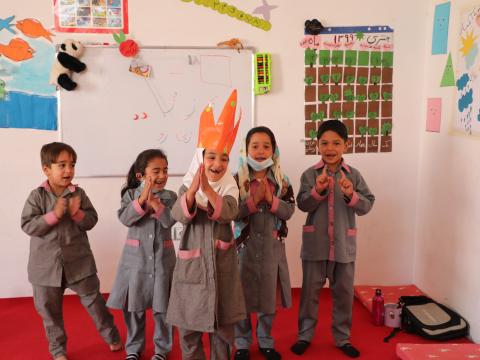Queen for a Day!

Sana, 6, is today’s queen in her class at the Early Childhood Development Centre (ECD) in the village of Serbestan, Herat. Sana attends classes six days a week, “to learn the alphabet, count numbers, and understand social life skills.” She has also made many friends with whom she plays games.
Maryam, 24, Sana’s mother, feels fortunate to have this opportunity. She was reluctant at first to enroll her daughter, “but when I learned how my neighbour’s children, who are in the same class [as Sana], had benefited from their lessons, I asked my partner to register Sana.” Maryam has seen a big difference in her daughter. “She has developed physically, and mentally …and always follows the hygiene practices she learned in the class. She also spends more time painting and writing characters and numbers,” she adds.
Abdul Fatah, Sana’s father, sees this initiative as an opportunity for child development. “I think this class can enhance Sana’s capacity and her self-confidence,” he explains. He has seen major improvements in his daughter’s reading skills: “When my friends call me, Sana can easily read the names on the screen of my cell phone.” Fatah is also one of the participants from Child Protection and Child Development training for ECD children male caregivers, “I learned about the child’s rights and child’s development, while I understood the negative consequences of physical punishment and different types of violence,” he shared his learnings. This training was conducted for male caregivers of the ECD students.
Female caregivers meet with the ECD teacher three times per week. According to Laila, 25, an instructor at the ECD, “Meetings have increased female caregivers’ interest in child [development] and welfare, particularly [with regard to] their daughters attending school.” Many have decided that studying at mosque alone is not enough and see the importance of ECD approaches in preparing children for regular school.
Nesar Ahmad, 55, is the head of Sana’s village. He is asking for more ECD classes: “I see that students who graduate from this class are more capable than [those who haven’t].” Other villagers have recognised this as well and request for more classes and see the programme extended.
As for Sana, she is looking forward to enter the first grade. “I am super excited and can’t wait for next year to go to school!” She feels confident and prepared and has already purchased her school uniform. “I practice my lessons with my sisters,” she says. “I also read poems and stories to them.” One of Sana’s two sisters is waiting to enter the next session of ECD classes.
World Vision Afghanistan (WVA) has conducted early childhood education programmes in the cities of Qala-I-Naw (2011), Chaghcharan (2012), and Herat (2016). During this time, 3,910 children (1,954 girls and 1,956 boys) between the ages of 5-6 have graduated from ECD projects supported by WVA. Project evaluations for 2017 showed that 98 per cent of children who participated in ECD classes had demonstrated elevated readiness skills for primary school, according to the standardised Age and Stage Questionnaire. Teachers reported that children who have completed ECD classes demonstrate more self-confidence and better understanding of social norms and positive social interaction compared to children who have not.
In 2020, WVA established 25 additional ECD spaces in Herat and Badghis. These programmes have provided a safe and stimulating environment for 750 children (378 boys and 372 girls) to learn literacy/numeracy and foundational life skills. The Foundational Development for Afghan Children at Early Years (FACE) Project was made possible through funding by World Vision Hong Kong.